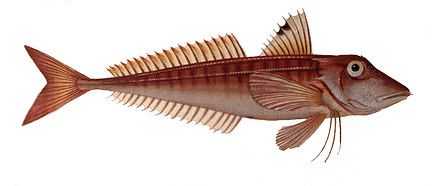Lumptail Searobin

Species Details
Prionotus Stephanophrys
Triglidae
Scorpaeniformes
Onshore, Nearshore, Coral Reefs, Estuaries, Mangrove Forests, Jetties,
1 - 3 lbs.
11" - 17"
Lumptail Searobin (Prionotus stephanophrys) Description
The Lumptail Searobin is a common brackish water game fish. It is has a rectangular-like shape body and its color has a gray-brown tinged with a white underside. It has a big bony head and is shaped almost like a square. It has rough scales and its snout is plated. It has 10 spines along its dorsal fin. They have large black pectoral fins that resemble that of the robin bird, hence the name sea robin. To differentiate this species from its relatives, like the striped searobin, look at the searobin’s pectoral fin. If it’s black, it’s a lumptail searobin.
Lumptail Searobin Size and Diet
The lumptail searobin is a small trash fish. It can be as big as 17 inches. On average, it’s only 11 inches in length. They primarily eat crabs and shrimp, but they also eat worms, squids, and octopi. As of now, the lumptail searobin is understudied and it doesn’t have an average weight or the heaviest weight recorded.
Interesting Facts About the Lumptail Searobin
- They use their wing-like pectoral fins to spread the ground to look for their prey.
- When this fish gets chilled. Its body produces slime, making it slippery.
- When threatened, they stretch out their large fins to make them look bigger
- Anglers often wear gloves when handling sea robins to prevent getting stung by their spines.
- In the game fish world, they are considered a nuisance or trash fish because it doesn’t have a market value. They do taste good, but the preparation and the meat that people get from it is not worth it. What’s good is they can be turned into nice baitfish for flukes and bass if you catch one.
How to Fish the Lumptail Searobin
To catch a lumptail searobin, try thinking of catching a fluke or flounder. Most of the time that’s what happens. Anglers will try to fish for flukes or bass, but oftentimes they get a lumptail searobin instead. They are bottom-dwelling fish and they are aggressive fish. Some anglers consider them as underrated and having too much of a bad rep.
To fly fish a lumptail searobin you need to set up your gear to hit the bottom. They often steal baits aimed for flukes or flounders. So, use equipment as if you are aiming for a fluke. A good depth for this fish is from 6 feet to 30 feet. Go to rocky crevices where they most likely hiding. You can do this by sight casting by the beach or rocky areas, or use a boat and get to a nice spot. They’re ambush predators, so only move your bait ever so slightly as you wait for a catch.
For the gear, use a 12 lb tippet with an 8- to 9- wt of 8 to 9 feet light action rod. For the line, use slow sinking tips Add some weights if you need to, a good weight would be 2 to 3 ounces.
The best baits to use are crabs, shrimps, and worms. The recommended lures to use are bucktails and sculpins. They have a big mouth so use hook sizes of 1/0 or 2/0.
Habitat and Distribution of the Lumptail Searobin
The lumptail searobin is scattered in the Pacific Ocean, especially in the eastern Pacific. Their range is from the U.S. all the way down to Columbia. They prefer temperate tropical or subtropical waters. Their depth is from 6 feet to 820 feet. You can find them in the offshore waters or nearshore waters of jetties, coral reefs, and rock crevices. They can also be found in estuaries and mangrove forests. They are non-migratory species, so they often stay in their area once they are born. They like their habitat muddy mixed with sand and gravel.
The best place to catch the lumptail searobin is in the Columbia River in Washington, Baja California, and the Gulf of California.







